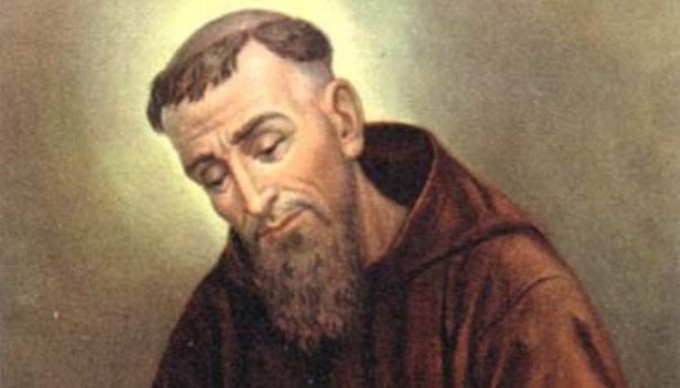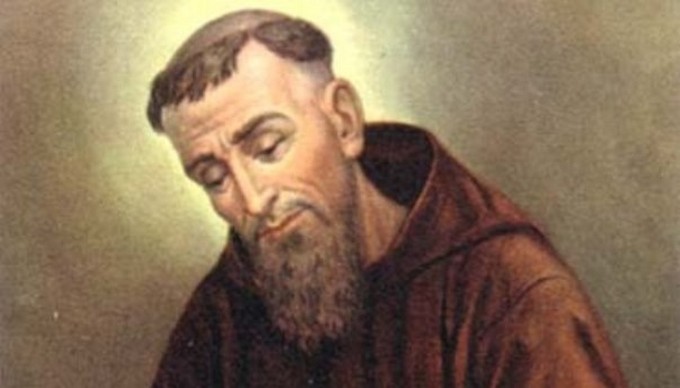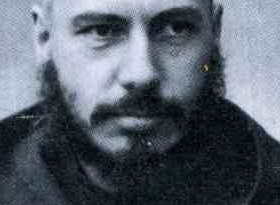Blessed Innocenzo da Berzo: a loving nothingness
On Wednesday 28 September 2022, was the liturgical memorial of Blessed Innocenzo da Berzo. Br Innocenzo came from Northern Italy, precisely from Niardo in Valcamonica, in the kingdom of Lombardy where he was born on 19 March, feast day of St Joseph, in 1844.
Before joining us the Capuchins he was a diocesan priest with the name of Giovanni Scalvinoni. Three years after he was ordained a priest Don Giovann was assigned to Berzo parish as its assistant parish priest. In fact, precisely on June 2 1867, he was ordered to Brescia by the bishop Girolamo Verzeri, who instantly sent him to Cevo in Valsaviore to fulfil the office of vicar co-adjutor.
Nonetheless, after two years the bishop called him back to Brescia and, this time, he appointed him vice-rector of the diocesan seminary. It needs to be said that responsible roles of authority and direction were a torment for the poor Giovanni. In fact, after just a year, he found him relieved from his duties. But why was he removed? In his process we read: As for his exercise of authority he was less than nothing. Having said that, when it came to aiding a poor person or simply staying in adoration before the tabernacle or reading and studying Giovanni was impeccable. His mum, who lived with him, who knew him so much had to be on her toes otherwise everything from the house would simply disappear. Suffice to say that a poor person arrives to beg for help and everything useful in the house would merely be given to that person, including a chicken in the pot that was reading to be eaten during the evening meal. His obvious persuasive calming reply to his mum would be the following: Anyway, we can eat tomorrow. It is necessary to consider our neighbour as in the bosom of the Lord. If he was not found in the Church to administer the sacrament of reconciliation or giving spiritual direction or any other ministry, Don Giovanni would surely be found in silent prayer near the altar or alternatively to long adorations he would go into the sacristy to read an article from the Summa of Saint Thomas.
God’s grace started working in the life of this simple priest. Giovanni felt deep within his heart that he was called to another place. On the other side of the valley, precisely lying on the mountain side slope, there was the Capuchin friary hermitage of the Annunciation. Its bell-tower was seen as reaching skyward. It was Blessed Amedeo Menez de Silva who founded it in the 1400’s whereas the Capuchins were living there for roughly thirty years. Giovanni’s heart was desperately longing for interiority as well as mystical silence. In one of his letters he thus confessed: The greatest need we have is to remain silent before our great God, both with our desire and without tongue whose speech – the speech that God hears more willingly – is the silent speech of love.
Giovanni had the grace of being reared up by a humble family of farm-workers between Niardo and Berzo. So this longing for God had a strong basis. From an early age the young Giovanni suffered greatly since his father Pietro as well as his grandmother died. Those terrible sufferings of sad separations together with those deep sentiments that were lived with the reserve, modesty and nobility of heart of the poor was also experienced within the prayer and devotion rhythm that came from a tradition of a concrete faith which was solid like the mountains around his home town.
The father figure for Giovanni was his uncle Francesco. It was he who put him to the municipal college in 1861. Having been taught by teachers of great spirit Giovanni managed to grow up in the spiritual orientation of his personality. He immediately displayed a great spirit of intelligence by obtaining the highest marks, as well as applying himself diligently to work, paying careful attention to the weak, a desire to serve as well as to remain hidden, and cultivating a profound passion for the Eucharist. Giovanni felt the call to go for the priesthood. Hence, instead of following his studies at the college he opted to enter the seminary in Brescia. Upon entering the seminary he imposed on himself a strict spiritual discipline, demonstrated in his numerous “spiritual rules” which he termed as Orari (or ‘schedules’). This he did so as to transform everything into prayer and the interior life.
With this in mind and heart Giovanni was ordained a priest but kept adapting his orari in his eagerness for an amazing interiority or spiritual life. However this was only to be fulfilled when, on 16 April 1874, at thirty years of age, with the blessing of his mother and the bishop, Don Giovanni went to the friary of the Annunciation and started his novitiate as a Capuchin bearing the name of Br Innocenzo da Berzo. His life as a Capuchin was anything but extraordinary. Following his temporary profession on April 29, 1875, his superiors sent him to the friary at Albino. After spending a year there Br Innocenzo returned back to the Annunciation friary where he made solemn vows on 2 Mary 1878. Then he was appointed vice-novice master. This assignment did not last long because the novitiate was transferred to Lovere in November 1879.
Since he was practically without a job, the well-educated provincial Br Agostino da Crema, who was also a friend of Rosmini, sent him to Mila in October 1880 to join the editorial group of the periodical Annali Francescani. In February of 1881, he received the obedience of going to the friary of Sabbioni di Crema. Again, in June of the same year we find him in his solitude at the Annunciation friary. Upon seeing his repeated failures the superiors and confereres understood that Br Innocenzo was to be left in isolation and secret. Contrary to what some felt that he might have had some inferiority problems, Br Innocenzo was very much aware of his limitations. The only work he did outside was that of giving to the poor whatever he might have at hand, irrespective if they were really poor or those who simply took advantage of his great goodness. It was not the first time when he used to return from questing happy and in peace because his sack was empty.
In autumn of 1889 Br Innocenzo was assigned the preached retreats of main friaries at Mila-Monteforte, Albino, Bergamo and Brescia. However, he managed to complete the first two due to his health. While preaching at Albino on 3 March 1980, he was on the verge of dying. The incident clearly showed that his was to be a hidden life. This humble Capuchin simply wanted to serve and take the last place possible, even to the point of becoming physically stooped; he would withdraw into a corner as if he wished to disappear.” In his exercise book he wrote, I will long to be subject to all and be horrified of being preferred in the slightest way. I am treated too well. I truly deserve something else, because I have so many debts with the Lord.
His attitude attracted huge humiliations from his confreres. How much maltreatment he received from them and this because his Masses seemed endless! But even if he underwent all this Br Innocenzo felt engulfed by the Holy Spirit whereas his exclamations and silent meditations went on uninterruptedly.
His great love for Jesus in expiation led him to invent many ways so as to suffer as well as be humiliated. Br Innocenzo was smart enough to laugh at his inabilities and lack of skill. The priests of Valle Camonica came to him for advice and he knew exactly how he could offer for them direct doctrinal precision and deep understanding. Having said that, his wisdom made him look incompetent. Br Innocenzo’s response to the Love that is not loved was his immense wish for both purification and prayer. He felt very uncomfortable with sin. Even the slightest venial offence was for him a cause of being very attentive not to offend God in any way.
The tabernacle was the main point of his attention. At the foot of the Eucharistic Christ Br Innocenzo found all this good available for him. Since the fraternal prayer was not enough for him. He kept yearning for more. Once he managed to discover a little door to the church from the friary library. From then on he would spend his time in the library to study. Nevertheless the books remained open and he would feel himself absorbed in mysterious Eucharistic intimacy. Br Innocenzo was so close to the tabernacle that he could not live without spending nights in silent adoration as he did in the church at Ossimo. How, in the presence of Jesus, his face would become radiant, beautiful and relaxed. In this way the parish priest found him when he came to open the church in the morning.
Br Innocenzo would meditate for a long time on the Cross regularly. His life story tell us that he would repeat the Stations of the Cross some eight or ten times daily, weeping and crying. Slowly slowly, divine grace transformed him into a zealous apostle of the Way of the Cross. A witness in his process of beatification said: When someone was seen making the Way of the Cross the friars knew that person had confessed to Br Innocenzo.
Ilarino da Milano wrote about him: His temperament was decidedly timid and his personal tendency disposed him to compliance and submissiveness, to always withdraw apart and stay in a corner. All the more striking or paradoxical is this fact. The transforming divine action not only did not cancel this psychological inclination to littleness and the conviction of being little, but used them amazingly to transform them into the practice of heroic virtue and into a mystical state.
John XXIII proclaimed him blessed on 12 November 1961. In his words, Blessed Innocenzo is a modern saint, a saint for our times. The secret of his very simple life, according to St Pope Paul VI, was that the biographers say that he kept his head bowed and it was difficult even to see his face. But if we look at the reality of this soul, we must say that he kept his eyes looking up, for as we gravitate towards the earth he truly gravitated, levitated towards heaven. Br Innocenzo simply fled and hid to let himself be immersed into that absolute, yearned for and sought emptiness. In a few words, that loving nothingness. Blessed Innocenzo da Berzo’s life was simply another solid footnote to substantiate St Francis’ claim: My God and my all!
Another address by Cardinal J. B. Montini, later St Pope Paul VI, delineates to us who Blessed Innocenzo da Berzo truly was, particularly in his features of humility, poverty and renunciation.
Innocent of Berzo is truly a humble friar. First he was a priest and later became a friar, staying always in the region of his own Camonica Valley. He is a modest, retiring saint, a saint who simplifies the work of the historian or orator.
Also, it is difficult to talk about him, because his life and holiness are made up of the so‐called “negative” virtues; no brilliant deeds or actions are present in his life; what distinguished him was the fact that he served everyone, in a spirit of absolute non-retaliation.
These features of humility, poverty, and renunciation shine out brilliantly in Innocent of Berzo. Anyone who really wants to know him should not elaborate other virtues or other aspects but should capture his genuine and, I would say, his deliberate characteristics, and these are precisely his hiddenness, his humility. We moderns, who live in a society that values very different aspects of life, almost feel a sense of unfamiliarity in his regard. We feel confused, and his distance in stature is all too evident, rather as Saint Paul wrote to the Corinthians: “You are noble, I am lowly born; you are great, I am small; you are powerful, I am weak”. And we see that somehow the same comparison is made about us. We boast about all our goods, about what we are, what we want, and what we can do.
Our constant tendency is to exalt our personality, in fact to be always searching for ways by which to develop ourselves, to affirm our own will and the ability to assert ourselves in life, to possess and to be strong. Innocent, on the other hand, threw away all these benefits, he almost despised them, without dramatic gestures but in a continuous, uniform act of renunciation and detachment. He never wished to appreciate them, never wanted them for himself, and when it seemed as though they were drawing close, he rejected them. He wanted to live in the most literal poverty, genuinely and utterly hidden from view, and with a humility that was not preached or expressed in words at all, but was something he lived and made his own, together with a search for those real conditions of distance from the world and silence of the opinion of others, which truly fill a person with abnegation and self‐sacrifice.
This is the image of himself that he presents to us, this is what we observe. We see him like this and we do, if you like, admire him, but at the same time we are a little uneasy. There is no measuring the distance between us and him, nothing to make him easily likeable, precisely because we are on two different tracks: we, moving towards so-called positive, earthly values, while he aims to strip himself of these very values and reaches for others known only to himself, sufficient and more satisfying to him than any other acquisition.
We should marvel, my brothers and sisters, that here we have a true Franciscan, a true son of that prodigy of sanctity who, seven centuries later, still amazes the world: Francis of Assisi. Precisely in this art of turning human affairs upside‐down and seeking delight and satisfaction in things that humans fear, in poverty and renunciation of the goods of this world, we find a literal almost photographic correspondence between Saint Francis and Innocent, and this is no small thing: It tells us at least that Blessed Innocent is truly listed among the “genuine”, in the catalogue of those who really have followed the example of the holy founder of the Franciscan Family.
O God, you gave the Blessed Innocent of Berzo the grace to follow completely the poor and humble Christ. May we too live our vocation faithfully, and so attain that perfection of charity which you present to us in your Son, who lives and reigns with you in the unity of the Holy Spirit, one God, for ever and ever. Amen.
Fr Mario Attard OFM Cap






